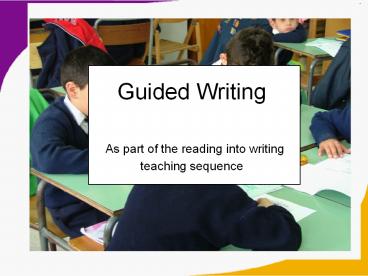Guided Writing As part of the reading into writing teaching sequence - PowerPoint PPT Presentation
Title:
Guided Writing As part of the reading into writing teaching sequence
Description:
Guided Writing As part of the reading into writing teaching sequence Background to guided writing Guided writing was part of the National Literacy Strategy from the ... – PowerPoint PPT presentation
Number of Views:2624
Avg rating:3.0/5.0
Title: Guided Writing As part of the reading into writing teaching sequence
1
Guided Writing As part of the reading into
writing teaching sequence
2
Background to guided writing
- Guided writing was part of the National Literacy
Strategy from the start - Supported in both Grammar for Writing and
Developing Early Writing - Focus now on guided writing as a precision
intervention
3
What does precision intervention look like?
- The creation of learning opportunities which
address the specific identified writing
development needs of a class/group/target group
(i.e. will lead to the achievement of appropriate
curriculum targets) - The delivery of this in the context of engaging
and motivating writing opportunities (visual
literacy, ICT, etc.)
4
What is guided writing?
- Guided writing is an essential component of a
balanced writing curriculum. - It is a mini-lesson within the literacy session.
- It offers precise intervention matched to need.
- Guided writing follows on from shared writing but
not necessarily during the same session.
5
What are the benefits for pupils?
- Guided writing enables pupils to
- make decisions, compose and revise their own
writing - become familiar with the management of the
writing process - be active participants in a writing conference
- be analytical and reflective about writing
- gain confidence
- discuss what makes effective writing
- build up a language to talk about writing.
6
What are the benefits for teachers?
- Guided writing enables teachers to
- focus on a specific, challenging aspect of
writing - support and challenge children in planning and
drafting their writing and in revising, editing
and evaluating work - provide explicit feedback and point the way
for forward for particular children - model how to give and accept constructive
criticism - provide focused and targeted support at the
point of composition (extension, consolidation,
simplification) - assess the childrens understanding, knowledge
and skills.
7
Guided Writing in the Teaching Sequence
Familiarisation with the genre / text type
Before writing
Capturing ideas
Teacher demonstration
Teacher scribing Supported writing Guided
writing Independent writing
During writing
After writing
8
Common features of effective practice
- Whole school approach to the teaching of writing
- Supportive learning environment
- Speaking and listening and drama used throughout
the teaching sequence - Use of curricular targets
- Effective use of day to day assessment strategies
- The teachers knowledge of the childrens needs
as writers. - A clear focus for development.
- The sessions are well structured.
- The children are able to apply learning to their
own work.
9
Addition/deletion/substitution What can we
add? What can we leave out / get rid of? What
can we change to make it sound better?
Exploration/generalisation The reason why it is
written What tends to be work best is
because The rule/pattern for this is When else
does this happen?
Identification selection of Important
features What I notice/like about This is
effective because Is that feature on the
checklist?
Praise/building confidence I really like the way
you because... Your choice to was good
because That works well because You have shown
the feature(s) of this text well
Drawing writing into talk and vice versa Tell me
how you would write How would an angry person
say that? So you think that? Tell your ideas to
your partner what do they think? What do you
think about? Say a little more about
Intervening in the writing process
Assessment strengths, weaknesses and
correction Which parts work best? Why does this
part not quite work? Show me the key features
of this type of text in your writing. Which is
the hardest bit to get right?
Extension/development Could we use, say ? You
could try Do you know another way of ? You can
carry on by? What detail could you add to
persuade the reader? How can you hook the
reader/make them want to read on?
Use of terminology/ reflection I really like the
(term) you chose because Which term could you
use here? Are all the features of this text in
your writing? Have you looked at the checklist?
10
Improving writing with a focus on guided writing
- These materials aim to
- Clarify messages about assessment, planning and
teaching writing - Strengthen the focus on teaching strategies for
writing especially guided writing - Illustrate effective practice
11
Case study Y3
12
Discussion
- What are the challenges for schools in
implementing guided writing? - What is the current position in your school?
13
Challenges for teachers in implementing guided
writing the regional picture
- Classroom management
- Gathering information and framing targets
- Knowledge and understanding of the writing
process - Understanding progression
14
Next Steps
- Identify groups of children and specific needs-
linked to curriculum targets (PWT) - Plan guided writing within the writing sequence
- Monitor effectiveness of guided writing and
impact on learning - Any further training/support?

